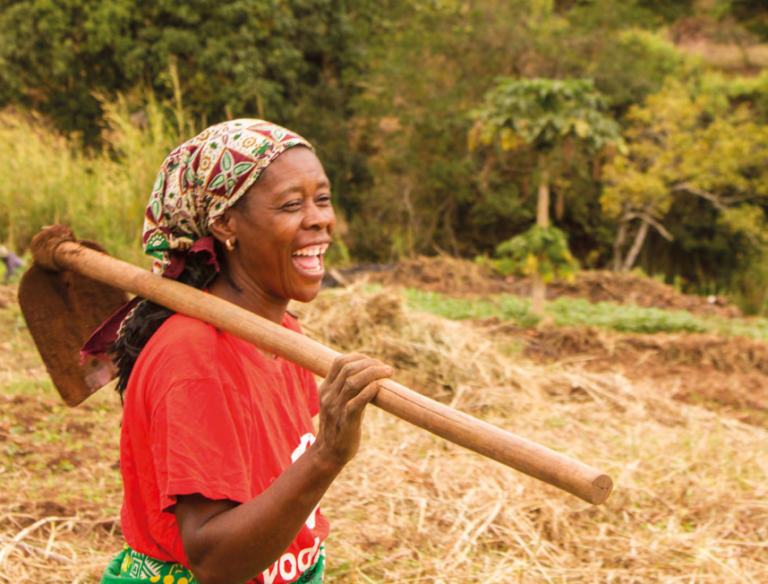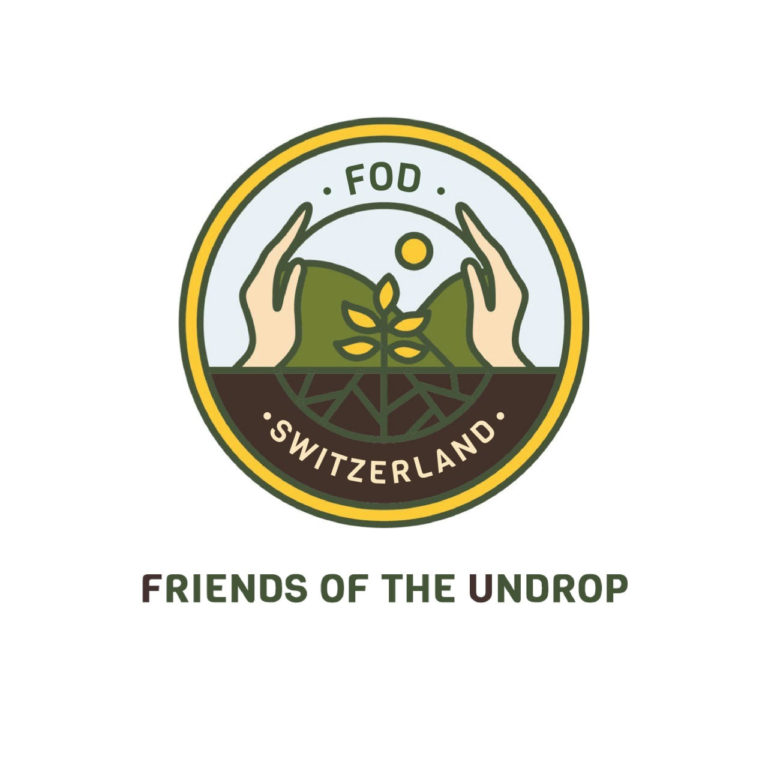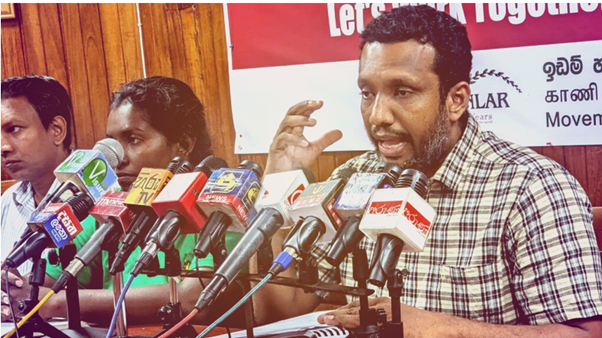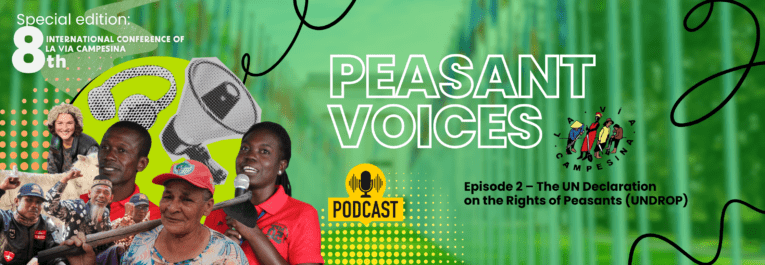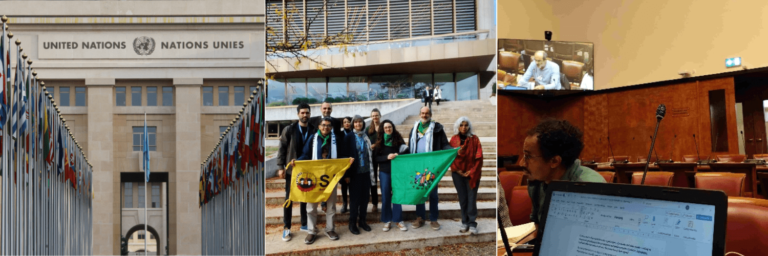International Instruments on Peasants’ Rights
INTRODUCTION
The UN Declaration on the rights of peasants and other people working in rural areas (UNDROP) has been adopted to protect the rights of some of the most marginalised people in the world, who together represent around two billion people: peasants, landless people, people living from traditional fishing, herding, and hunting activities, and rural workers. The UNDROP is based on a number of international instruments, including (1) international human rights instruments, (2) the Convention on Biological Diversity and its Protocols, and (3) the Plant Treaty.
INTERNATIONAL HUMAN RIGHTS INSTRUMENTS
Universal Declaration of Human Rights (UDHR)
The Universal Declaration of Human Rights (UDHR) has been adopted in 1948. In the UDHR, UN Member States proclaimed civil and political rights (CPR) as well as economic, social and cultural rights (ESCR). Among the rights that are particularly important for peasants, one can mention the rights to food, health and social security enshrined in UDHR’s articles 21 and 25.
International Covenant on Economic, Social and Cultural Rights (ICESCR)
The International Covenant on Economic, Social and Cultural Rights (ICESCR) has been adopted in 1966, and it has more than 170 States Parties. The ICESCR protects the rights to social security (article 9), food (article 11) and health (article 12), among other ESCR. The right to food in ICESCR is composed of the right to adequate food (article 11.1) and of the fundamental right to be free from hunger (article 11.2). It has been interpreted by the UN Committee on ESCR, in charge of supervising the ICESCR, as the right to food that is available, adequate and accessible to all. Correlative obligations include the need for States take steps to protect the most vulnerable people, including peasants, and to provide them with access to the natural resources that they need to feed themselves and their family in dignity.
International Covenant on Civil and Political Rights (ICCPR)
The International Covenant on Civil and Political Rights (ICCPR) has been adopted in 1966, and it has more than 170 States Parties. The ICCPR protects important rights for peasants, such as the right to life and physical security (articles 6, 7), freedom of movement (article 12), access to justice (article 14), the right to privacy, family and home (article 17), freedoms of expression, assembly and association (articles 19, 21, 22), the rights of minorities to their own culture (article 27) and the right to non-discrimination (article 26). The UN Human Rights Committee, in charge of monitoring the ICCPR, has recently interpreted some of these rights to protect the rights to food and to land of peasants.
International Convention on the Elimination of All Forms of Racial Discrimination (CERD)
The International Convention on the Elimination of All Forms of Racial Discrimination (CERD) has been adopted in 1965. It has more than 180 States Parties, which have committed to prohibiting and eliminating racial discrimination in all its forms and guaranteeing every person’s right to equality before the law, without distinction of race, colour or ethnic or national origin, in particular in the enjoyment of ESCR (article 5). Important rights for peasants that are mentioned explicitly in CERD’s article 5 include the rights to a just and favourable remuneration, to social security and social services, and to own property alone or in association with others.
The Committee for the Elimination of Racial Discrimination, in charge of monitoring CERD, noted that on the basis of CERD’s article 5, States Parties shall fight discrimination in access to food and land by vulnerable persons and groups, which include peasants.
Convention on the Elimination of All Forms of Discrimination Against Women (CEDAW)
The Convention on the Elimination of All Forms of Discrimination Against Women (CEDAW) has been adopted in 1979, and it has 189 States Parties. Its article 14 is particularly important for peasant women.
CEDAW’s article 14 provides that States Parties to CEDAW shall take into account the particular problems faced by rural women and the significant roles that rural women play in the economic survival of their families, including their work in the non-monetized sectors of the economy, and that they shall eliminate all forms of discrimination against women in rural areas. It provides that States Parties shall ensure the equal rights of rural women to participate in development planning; to adequate health services; to social security; to training and education; to organize self-help groups and co-operatives; to agricultural credit and loans, marketing facilities and appropriate technology; to equal treatment in land and agrarian reform as well as in land resettlement schemes; and to adequate living conditions, particularly in relation to housing, sanitation, electricity and water supply, transport and communications.
The UN Committee on the Elimination of Discrimination Against Women (CEDAW Committee), in charge of monitoring CEDAW, underlined that ‘rural women are critical to achieving food security, reducing poverty, malnutrition and hunger, and in promoting rural development’. It provided that States Parties to CEDAW should ensure rural women’s rights to food, nutrition and seeds, as well as their rights to manage and control natural resources, within the framework of food sovereignty, and in accordance with their right to equality in marriage and family relations.
Convention on the Rights of the Child (CRC)
The Convention on the Rights of the Child (CRC) has been adopted in 1989, and it has 196 States Parties. The CRC accords a central place to the protection of the right to food of children, justified by the prevalence of malnutrition as the primary cause of infant mortality throughout the world.
The CRC is based on the principle that States are not the sole guarantors of the fulfilment of the protected rights. The parent(s) or others responsible for the child have the primary responsibility to secure, within their abilities and financial capacities, the conditions of living necessary for the child’s development. To facilitate their task, CRC’s article 27 provides that States Parties must adopt appropriate measures and must offer, if need be, material assistance and support programmes, especially regarding food.
The CRC also aims at fighting child labour, which for 71% – 108 million children – takes place in agriculture. CRC’s article 32 recognizes the right of the child to be protected from economic exploitation and from performing any work that is likely to be hazardous or to interfere with child’s education, or to be harmful to child’s health or development.
UN Declaration on the Rights of Indigenous Peoples (UNDRIP)
The UN Declaration on the Rights of Indigenous Peoples (UNDRIP) was adopted in 2007, after 25 years of mobilisation by indigenous peoples’ organizations and their supporters, and 11 years of negotiations at the UN Human Rights Council and General Assembly.
UNDRIP enshrines several rights that are important for indigenous peasants, such as the rights of indigenous peoples to their lands, territories and resources (articles 10, 25 to 32), their right to development (article 23), their right to the conservation and protection of the environment (article 29), their right to maintain, control, protect and develop their cultural heritage, traditional knowledge and traditional cultural expressions, as well as the manifestations of their sciences, technologies and cultures, including human and genetic resources, seeds, medicines, and knowledge of the properties of fauna and flora (article 31), and their right to have access to justice (article 40). UNDRIP’s article 17.2 also protects indigenous children against child labour, and its article 39 provides that indigenous peoples have the right to have access to financial and technical assistance from states and through international cooperation, for the enjoyment of their rights.
UN Declaration on the Rights of Peasants and Other People Working in Rural Areas (UNDROP)
UNDROP has been adopted in 2018, after almost 20 years of mobilization by La Via Campesina and its allies, and 6 years of negotiation at the UN Human Rights Council and General Assembly.
The UNDROP expresses deep concern at the structural discrimination faced by peasants and other people working in rural areas, who disproportionally suffer from, inter alia, poverty, hunger, and malnutrition, forced evictions and displacements, and criminalisation (Preamble and art. 3.3), and it recognises an important number of rights to overcome that situation.
UNDROP’ article 1 defines peasant as any person who engages or who seeks to engage, alone, or in association with others or as a community, in small-scale agricultural production for subsistence and/or for the market, and who relies significantly, though not necessarily exclusively, on family or household labour and other non-monetized ways of organizing labour, and who has a special dependency on and attachment to the land. It also provides that UNDROP applies to any person engaged in artisanal or small-scale agriculture, crop planting, livestock raising, pastoralism, fishing, forestry, hunting or gathering, and handicrafts related to agriculture or a related occupation in a rural area, as well as to dependent family members of peasants, indigenous peoples and local communities working on the land, transhumant, nomadic and semi-nomadic communities, and the landless engaged in the above-mentioned activities. Moreover, it adds that it also applies to hired workers, including all migrant workers regardless of their migration status, and seasonal workers, on plantations, agricultural farms, forests and farms in aquaculture and in agro-industrial enterprises.
Some of the most important rights enshrined in UNDROP include the rights to land and other natural resources (articles 5 and 17), to freedom of thought, conscience, religion, opinion, expression, and peaceful assembly (art. 8), to create and join organizations to defend their rights (art. 9), to participation and information (arts. 10 and 11), to access to justice (art. 12), to food and food sovereignty (article 15), to an adequate standard of living, including the right to sell products at prices that guarantee a decent income and livelihood (art. 16), to seeds and biological diversity (articles 19, 20), to water, including for irrigation, and to sanitation (art. 21), to social security (art. 22), to health (art. 23), to a safe, clean and healthy environment (art. 18), to housing (art. 24), to education and training (art. 25), as well as cultural rights (art. 26).
UNDROP’s article 4 provides that states shall take all appropriate measures to eliminate all forms of discrimination against peasant women and other women working in rural areas, including women family farmers, to promote their empowerment, and to ensure that they enjoy without discrimination all the human rights and fundamental freedoms set out in the UNDROP. It is also important to mention that UNDROP’s articles 13.2 and 13.6 aim at protecting children in agriculture from child labour.
THE CONVENTION ON BIOLOGICAL DIVERSITY AND ITS PROTOCOLS
The Convention on Biological Diversity (CBD) was adopted in 1992. Today, it has acquired almost universal acceptance, with 196 States Parties. The CBD protects important elements of the right to seeds of indigenous and local communities, including peasants, through provisions aimed at ensuring the protection of indigenous and local communities’ traditional knowledge and practices, and the fair and equitable sharing of the benefits arising out of the utilization of genetic resources, including by appropriate access to these resources.
The two Protocols to the CBD are also important for peasants. In the Cartagena Protocol on Biosafety, adopted in 2000 and to which more than 170 States are parties, States have agreed to take measures to protect biological diversity and indigenous and local communities from the potential risks posed by genetically modified organisms (GMOs). In the Nagoya Protocol on Access to Genetic Resources and Benefit-Sharing (Nagoya Protocol), adopted in 2010 and ratified by more than 110 States, States have further defined benefit-sharing obligations arising from the use of traditional knowledge associated with genetic resources, and from research and development on genetic resources held by indigenous and local communities (article 5). They have also committed, ‘as far as possible, not to restrict the customary use and exchange of genetic resources and associated traditional knowledge within and amongst indigenous and local communities’ (article 12.4).
THE PLANT TREATY
The most important international treaty for the protection of the right of peasants to seeds is the International Treaty on Plant Genetic Resources for Food and Agriculture (Plant Treaty), adopted by consensus at FAO in 2001. It has more than 140 States Parties today. The Plant Treaty establishes a multilateral system to facilitate access to seeds and planting material and to share their benefits in a fair and equitable way. It complements the CBD and its provisions protecting farmers’ rights, which aim at drawing attention to the unremunerated innovations of farmers which are as the foundation of all modern plant breeding, have been described as vital to the preservation of agro-biodiversity.
In the Plant Treaty’s Preamble, States affirmed that ‘the rights recognized in this Treaty to save, use, exchange and sell farm-saved seed and other propagating material, and to participate in decision-making regarding, and in fair and equitable sharing of the benefits arising from, the use of plant genetic resources for food and agriculture, are fundamental to the realization of Farmers’ Rights, as well as to the promotion of Farmers’ Rights at national and international levels’.
In Plant Treaty’s article 9, States recognized ‘the enormous contribution that the local and indigenous communities and farmers of all regions of the world, particularly those in the centres of origin and crop diversity, have made and will continue to make for the conservation and development of plant genetic resources which constitute the basis for food and agriculture production throughout the world’. The same article requires States Parties to take measures to protect and promote farmers’ rights, by: ‘(a) protecting traditional knowledge relevant to plant genetic resources for food and agriculture, and affirming (b) the right to equitably participate in sharing benefits arising from the utilization of plant genetic resources for food and agriculture, and (c) the right to participate in making decisions, at national level, on matters related to the conservation and sustainable use of plant genetic resources for food and agriculture’.
INTERNATIONAL INSTRUMENTS TO PROTECT PEASANTS’ RIGHTS
- Universal Declaration of Human Rights, 1948
- International Convention on the Elimination of All Forms of Racial Discrimination, 1965
- International Covenant on Economic, Social and Cultural Rights, 1966
- International Covenant on Civil and Political Rights, 1966
- Convention on the Elimination of All Forms of Discrimination against Women, 1979
- Convention on the Rights of the Child, 1989
- Convention on Biological Diversity, 1992
- International Treaty on Plant Genetic Resources for Food and Agriculture, 2001
- UN Declaration on the Rights of Indigenous Peoples, 2007
- Nagoya Protocol on Access to Genetic Resources and the Fair and Equitable Sharing of Benefits Arising from their Utilization to the Convention on Biological Diversity, 2010
- UN Declaration on the Rights of Peasants and Other People Working in Rural Areas, 2018

